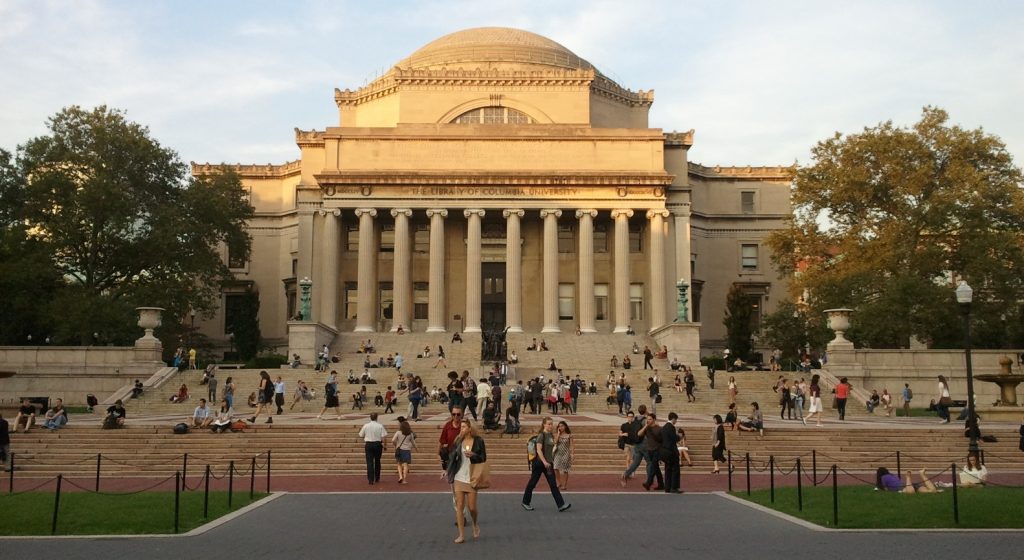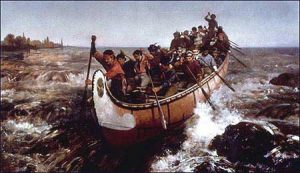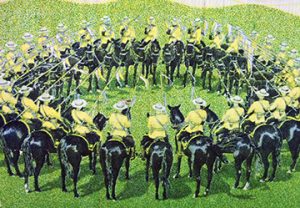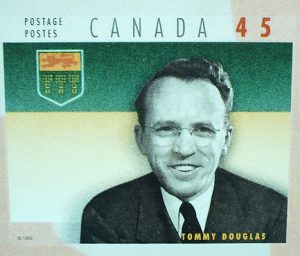
Dear Canada:
I’m on the verge of walking away from our relationship. I confess, that I was going to go until LMDA President Beth Blickers, ever the diplomat, told me she was concerned that perhaps I hadn’t expressed my feelings properly. That I hadn’t sorted out our story. She suggested I that if I wrote my thoughts down in a loving letter to you, and then read the letter out loud to my friends at LMDA, maybe we’d find a way to stay together.
Sometimes I feel we’ll never know each other because, quite frankly, you just don’t know yourself. This has been bothering me for a while. I’ve suggested therapy, but you keep claiming you can work out these identity issues on your own. It hasn’t happened yet and I’m beginning to wonder if it ever will.
Who are you Canada?
In a 1967 television interview the Canadian visionary Marshall McLuhan said you’re the only country in the world that knows how to live without an identity. Echoing his sentiments somewhat, the poet Irving Layton said, “A Canadian is someone who keeps asking the question, ‘What is a Canadian?’”
I think he was confusing Canadians with Dramaturgs but anyway, you get the idea.
For as long as I can remember, you’ve defined yourself in opposition, by talking about what you are aren’t rather than what you are. And topping the list of what you claim you’re not is – American.
Maybe you knew yourself back in the beginning. Back in the early 1600’s when you were one of the four colonies of New France and the terms Canada and New France were interchangeable. But after the French ceded you to Britain in 1763, when New France became part of the British Empire at the end of the French and Indian wars, your sense of self began to slide. When the United States was successful in their revolutionary bid to get rid of British rule from the 13 colonies, the territories of the former New France that stayed under British control were given the names of Upper Canada and Lower Canada.
I’m not a psychiatrist, but it sounds like the beginnings of Dissociative Identity Disorder to me.
It might have seemed like it was all going to work out when England passed the British North America Act in 1867. It was Canada’s confederation.
You were quite the talker then, convincing the home country to let you go without firing a shot. You seemed to be reborn as an independent nation. Although parts of the BNA act allowed the Governor General (the Queens representative in Canada) the power to strike down laws enacted by the Canadian parliament within three years of their passage.
 American identity stories are so clean. Maybe that’s why you’re so eager to adopt them. Take the Puritans and the Mayflower, for example. That story is so well packaged that you’ve introduced Puritan symbols into your own thanksgiving celebrations, even though the Puritans had nothing to do with Canada. In the early 1600’s, while the Protestant Puritans were arriving on the shores of New England, you, dear Canada, were welcoming the Catholic Jesuits to New France.
American identity stories are so clean. Maybe that’s why you’re so eager to adopt them. Take the Puritans and the Mayflower, for example. That story is so well packaged that you’ve introduced Puritan symbols into your own thanksgiving celebrations, even though the Puritans had nothing to do with Canada. In the early 1600’s, while the Protestant Puritans were arriving on the shores of New England, you, dear Canada, were welcoming the Catholic Jesuits to New France.
Truth be told, I’ve always preferred the French Canadian Voyagers to those stuffy tight-assed Puritans anyway. The Voyagers sang. They partied. They dressed in flamboyant clothing. It’s like comparing the people of the Upper East Side to the people of Williamsburg.
I also love the fact that the fun-loving fur-trading French Canadian Voyagers didn’t see themselves as “kings of the wild frontier”. Their worldview was more in-line with the native peoples with whom they worked. They saw themselves as a part of nature, not as the rulers of it. I like to think that’s an important part of who you are. And maybe it’s true. I mean it certainly was for those guys who started Green Peace in Vancouver back in 1971.
I love your images of Jacques paddling down the Saint Lawrence River singing French songs – stopping just long enough to get married.
I love that you called the offspring of these French and First Nations peoples the Métis. It’s got a nice ring to it.
Okay, so you may have identity issues and a little anxiety, but at least you’re a good planner. You remember the 1870’s, when the US was randomly blasting its way through the Wild West? Your biggest railway company was planning its own incursions by drawing towns on maps, spacing them 7 miles apart along the railway-line and naming them – in alphabetical order.
Fenwood, Goodeve, Hubbard, Ituna, Keller, Lestock, Punnichy, Raymore, Semans, Tate.
Now that’s dramaturgy.
Back in those days your law enforcement was well planned too. Even so, I can’t help but envy those great chaotic stories from the American west, where men were hard and their whiskey was harder. Where federal Marshals stood their ground in front of the setting sun to dollop out big helpings of frontier justice to men stupid enough to take a seat on the wrong side of the law.
In contrast, you, dear Canada, created a police force, trained them in the east and then sent them westward – to control the American whiskey smugglers and the towns that were still waiting to be built.
 Remember when you thought you’d spook the Americans into thinking there was an arms build up happening on their border if you called this force The Northwest Mounted Rifles like you’d planned? So you called them the Northwest Mounted Police instead.
Remember when you thought you’d spook the Americans into thinking there was an arms build up happening on their border if you called this force The Northwest Mounted Rifles like you’d planned? So you called them the Northwest Mounted Police instead.
That was very polite of you.
A hundred years later, in 1994, the Disney Corporation was given a five-year contract to handle the marketing and licensing of RCMP iconography. Control of the trademarks had been given over to Disney when the RCMP hired the company to promote their image and protect them from being abused in the commercial marketplace.
Let me get this straight Canada.
Your federal police force went to Disney for protection.
I just can’t see J Edgar Hoover in bed with Mickey Mouse. That said I have trouble picturing J Edgar Hoover in a dress. Anyway, the whole thing makes me nervous.
Margaret Atwood once said that “If the national mental illness of the United States is megalomania, that of Canada is paranoid schizophrenia.”
Most people in Canada probably think that if the United States has a mental illness, we should have one too.
Luckily it’s possible to treat both Paranoid Schizophrenia and Megalomania with drugs. By the way Canada, did you know you’re the second largest per-capita consumer of pharmaceutical drugs in the world? But guess whose first?
Canada, you’ve really got to try harder.
 Pierre Trudeau, one of your most flamboyant and storied Prime Ministers, a guy who sometimes channeled the Voyagers in his photo-ops, and the man who repatriated our Constitution in 1982, said: Americans should never underestimate the constant pressure on Canada, which the mere presence of the United States has produced. We’re different people from you and we’re different people because of you. Living next to you is in some ways like sleeping with an elephant. No matter how friendly and even-tempered the beast, one is affected by every twitch and grunt.
Pierre Trudeau, one of your most flamboyant and storied Prime Ministers, a guy who sometimes channeled the Voyagers in his photo-ops, and the man who repatriated our Constitution in 1982, said: Americans should never underestimate the constant pressure on Canada, which the mere presence of the United States has produced. We’re different people from you and we’re different people because of you. Living next to you is in some ways like sleeping with an elephant. No matter how friendly and even-tempered the beast, one is affected by every twitch and grunt.
He also famously said, after he decriminalized homosexuality in 1969, “there’s no place for the state in the bedrooms of the nation”.
Still, if you’re seeing elephants in your bed Dear Canada, I suggest you try Seroquel.
John Raulston Saul, one of your brightest public intellectuals, claims our roots of accommodation came through close working contact with the aboriginals, and the development of the Métis culture. He believes that the often ignored role of the natives as full partners in the military, civil and commercial affairs of the “Canadas” for the first 250 years of their existence is a huge problem when it comes to trying to articulate a national identity.
Saul’s premise is that, unlike the US, whose foundation of statehood came out of the European Enlightenment, Canada’s foundational culture is more aboriginal, embracing values of negotiation, tolerance, inclusivity and accommodation.
What Saul sees as a Métis view of living could be perceived to be Socialist. I’ll be reading this letter to my American friends and I don’t think I can use the word Socialist in the United States.
(Well, maybe in New York City.)
Saying the word Socialist, over the phone at least, could put me on the Department of Homeland Security’s watch list. Socialism is so wicked the very word is almost unspeakable in the US.
Better to talk in terms of the 99%.
Or income inequality.
Or the wealth gap.
 I grew up in the province that was the birthplace of social democracy in Canada.
I grew up in the province that was the birthplace of social democracy in Canada.
(I wonder if I’ll be taking a bus back to Vancouver when my flying privileges are revoked.)
Tommy Douglas and the Co-operative Commonwealth Federation, later named the New Democratic Party, was elected on June 15, 1944. They formed the first socialist government in North America.
As a Baptist Minister and the leader of the CCF in Saskatchewan, Tommy Douglas brought his province North America’s first arts council, a regional library system, an increase in the minimum wage, a workweek capped at 44 hours (I wonder where that went?), a guarantee of two weeks paid vacation for all workers, and an increased education budget.
The list goes on, including free health care for pensioners. Free psychiatric hospital treatment for the mentally ill. And a balanced budget in the first four years of his mandate. Eventually his work resulted in a Canada wide guarantee of universal Medicare.
In Douglas’s own words: “I felt that no boy should have to depend – either for his leg or his life – upon the ability of his parents to raise enough money to bring a first-class surgeon to his bedside and that people should be able to get whatever health services they require irrespective of their individual capacity to pay.
He also said: “… a nation’s greatness lies not in the quantity of its goods but in the quality of its life.”
If it’s one thing that holds us together Canada, it’s the idea that the tax base works to support the health of everyone in your family. There’s something fundamental in that proposition.
Today, for the first time in history, the NDP is your official opposition party in the federal parliament – and the party that just won the recent provincial election in Alberta.
Alberta.
Voting NDP in Alberta is like voting for Ralph Nader in Texas.
You really made me laugh with that one.
So why do I love you? For your humour, your interminable almost paranoid insecurity, your lack of an articulated identity and your basic decency. And for the fact that I still believe you’re trying hard to be a fair country.
Or, maybe it’s because you are no one, and you are everyone.
The famous Canadian architect Arthur Erickson argues that Canada’s lack of national identity will prove to be the country’s strength in the 21st century, as the world moves toward what he calls a “humanity-wide consciousness.” He goes on to say that by having “no history of cultural or political hegemony, we are more open to, curious about, and perceptive of other cultures.”
It’s this open curiosity and respect that will continue to make you, Canada, one of the great 21st century social experiments. Right now your foreign-born population is 21% compared with 13% in the United States. It’s one of the highest in the world. And yet, things are running pretty well, all things considered. Your social dramaturgs are still on task.
John Ralston Saul also said: “Canada is either an idea or it does not exist. It is either an intellectual undertaking or it is little more than a resource-rich vacuum lying in the buffer zone just north of a great empire.”
So how will your story end? Will you be subsumed by the United States? Or will you shine on as a fully realized nation? I have no idea. But for the moment, I think you characterize the notion of how people, on a very small and very crowed planet, might be able to live together side by side, uncertain of what to call the association, but reasonably comfortable with it none-the-less.
And for that, Canada, I love you.
Thank you.









